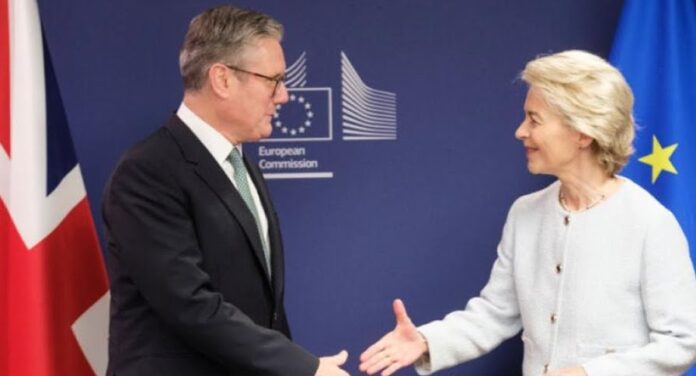Gibraltar accepts an EU-aligned 15% sales tax to erase the border with Spain and join the Schengen zone.
Gibraltar has struck a landmark agreement with Spain and the European Union, agreeing to impose a 15% sales tax on goods as part of a sweeping post-Brexit settlement that will erase its border with Spain and integrate the British overseas territory into the Schengen zone.
After years of tense negotiations, officials unveiled the breakthrough on Wednesday. Under the deal, Gibraltar will introduce a minimum “transaction tax” on goods within three years of ratification, addressing long-standing concerns over unfair competition from Spanish businesses.
“For Gibraltar, it was a big ask,” admitted a senior European official. “They have always claimed that this taxation would create a serious economic problem.” Nonetheless, Brussels insisted on tax alignment as a condition for Gibraltar’s integration into the EU’s customs union, a key feature of the broader agreement.
The pact, hailed by negotiators as “historic,” will eliminate physical border controls between Gibraltar and the rest of the Iberian Peninsula. Gibraltarians will be able to move freely throughout the surrounding region, though without broader rights to work or settle elsewhere in the EU.
Under Schengen rules, British citizens—including Gibraltarians—will still face limits on the length of their stays in EU territory: a maximum of 90 days within any 180-day period. Spanish border officials, stationed at Gibraltar’s airport and port, will have authority to deny entry to British nationals who exceed these limits.
On the commercial front, the deal brings significant changes. Spanish customs officers will inspect goods crossing Gibraltar’s land border—the main entry point for almost all imports—ensuring compliance with EU customs standards. Gibraltar’s eventual accession to the EU customs union remains subject to further negotiations.
Spain’s foreign minister, José Manuel Albares, welcomed what he described as “the tax convergence process that will ensure everybody is treated fairly.” He added, “Now Gibraltar is linked to the customs union. There will be fair competition for everybody.”
Madrid has long expressed frustration over Gibraltar’s low-tax regime, which it argued allowed smugglers and organised crime groups to exploit price differences across the border, particularly in the trade of cigarettes. European anti-fraud authorities have repeatedly highlighted the territory as a hub for cross-border smuggling.
The Gibraltar government, which retains the power to set taxation policy on the Rock, has so far not commented on the new agreement.
This deal arrives just weeks after London and Brussels agreed to reset wider UK-EU relations, with European officials suggesting that resolving Gibraltar’s post-Brexit status was critical to unlocking progress in other contentious areas, including defence cooperation and veterinary standards.
Spain, for its part, had previously blocked British participation in certain EU defence projects, using Gibraltar’s unsettled status as leverage. Without this compromise, Spanish officials could have continued to stall negotiations on several key files. “Everyone wanted to find compromises, solutions, and it was the right moment to do that,” said the European official.
Gibraltar’s integration into the Schengen area and alignment with EU customs rules marks a significant shift for the tiny British enclave, home to just over 30,000 residents. For years, the territory’s future status after Brexit had remained one of the most complicated and politically sensitive issues left unresolved.
As the agreement now heads toward formal ratification, Gibraltar faces the challenge of adjusting its economy to the new 15% transaction tax while maintaining its attractiveness as a financial and commercial hub.
